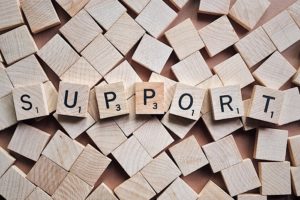- MN ABE Connect
- Archive
- I’m tired!
 September 28, 2020
September 28, 2020
I’m tired!
Wendy Sweeney, MA, LP, PANDA ManagerHow can you and your students manage constantly evolving change in our COVID world?
 I do not know about you, but I am tired.
I do not know about you, but I am tired.
- Tired of washing my hands until they are raw.
- Tired of feeling limited socially.
- Tired of people who refuse to wear masks.
- Tired of wearing masks.
- Tired of the COVID pandemic with no end in sight.
- Tired of worrying about getting COVID.
- Tired of people denying the virus and discounting scientists.
- Tired of continually having to adapt between distance learning and in-person instruction.
We are grieving loss in our lives as the COVID-19 pandemic continues to threaten people’s lives and we are uncertain about when it will end. You may feel fatigue, disappointment, sadness, or fear about your district’s decision to teach students virtually, in-person or in a hybrid model. Your students may be having similar feelings.
The most well-known research on grief was completed by Swiss-American psychiatrist Elisabeth Kübler-Ross in her 1969 book On Death and Dying. Although her research was based on how people cope when dying, the five stages of grief she identified are similar to what many people may be going through right now. These stages do not necessarily happen in any particular order and you may or may not fit into any of these categories:
Denial about COVID-19 being dangerous, that it exists, that we need to isolate or use masks
Anger about limitations, those who are not thinking about the greater good, racial inequities, not being able to see students in-person, constant change of plans
Bargaining about seeing people socially, letting down your guard, adapting to change, fluctuating feelings
Depression about ongoing struggles, not being able to do what you could do in the past, people’s reactions, spending so much time at home, the negative social media, isolation, sadness
Acceptance about the virus being here to stay (at least for now), taking things one day at a time, doing the best you can with what you have, change being a constant in our lives
Change is hard for everyone. Just think about trying to change yourself and how difficult this can be. Now try to change other people or national views. This is very difficult. Change tends to happen slowly due to the resistance associated with it. School district education options are changing and modifying in response to COVID and safety frequently, which can feel quite overwhelming. One way to adapt to change is to be flexible and open-minded to the positive possibilities change can provide.
How to take care of yourself:
- Be flexible and adaptable. Picture yourself as a pipe cleaner. It is bendable and can be used for various purposes. Read about how to weather the pandemic and bounce back.
- Break down daily tasks into manageable attainable steps. It is easy to feel overwhelmed, particularly at the beginning of the school year. Try to focus on one day at a time.
- Identify the positives of distance learning. Could this model work well for students who do not have daycare, have long distances to drive or do not have transportation? Does a reduced amount of commute time, not driving in the winter, or being home with family benefit you?
- Put things in perspective. Although it may seem like a lifetime, we have been faced with the pandemic for only six months. This is not a long period of time in the big picture. We are a determined, resilient country. This will get resolved eventually. With racial strife, we have a long way to go in ending racial inequities. However, there has been progress over time to reduce discrimination. Although change has not occurred as quickly as many would like, many people are much more aware of the inequities brought to light and there are more recent efforts being made to implement change for a better future.
- Be hopeful. We all need to be reminded of the good in most people and the desire for a better world by the majority.
Pause, deep breathe. Notice how you feel. Watch this video for a laugh.
 This is a very difficult time in our lives. Try to think about US instead of me. We need to sacrifice and do what is right for the greater good. We are all fighting the same war. Put your energy into what you can control, such as being kind and welcoming to your students and working hard to do a good job despite the challenges.
This is a very difficult time in our lives. Try to think about US instead of me. We need to sacrifice and do what is right for the greater good. We are all fighting the same war. Put your energy into what you can control, such as being kind and welcoming to your students and working hard to do a good job despite the challenges.
Make sure to exercise, balance work and home life, and do something you enjoy every day. Seek professional help if you feel overwhelmed or unsafe. For more ideas, read this handout from Mental Health America about protecting teacher mental health.
How to support your students:
Take the free online course titled, “Teaching ABE Students about Mental Health”, developed by PANDA consultant and Robbinsdale teacher, Colleen Crossley. Now is a good time to teach students about mental health and get four CEUs in the process. This course is intended to meet CEUs in understanding key warning signs of mental illness. To access this course, go to https://pandamn.org/pd/
Build relationships with your students. We all need connection with others and a trusting relationship to feel supported. The beginning of the year is a good time to implement activities which involve getting to know each other. Talk to students about uncertainty and fear. Listen and validate their concerns.
Ask students to share stories about how they have overcome adversity and solved problems. Inform them about healthy ways to cope both mentally and physically. Such as, reaching out to others, lending a helping hand, exercising, and eating a balanced diet.
Inform students about mental health and community resources. A list of resources, including mental health professionals, free crisis phone numbers/websites, cell phone apps, and self-help are all available on PANDA’s website at https://pandamn.org/mental-health/resources-6/ Please contact PANDA with any questions or concerns at [email protected] or call Wendy Sweeney at 763-504-4095.
PANDA – Minnesota ABE Disability Specialists
Physical And Nonapparent Disability Assistance
Newsletter Signup
Get MN ABE Connect—the official source for ABE events, activities, and resources!
Sign UpArticle Categories
- ABE Foundations/Staff Onboarding
- ACES/Transitions
- Adult Career Pathways
- Assessment
- CCR Standards
- Citizenship
- COVID-19
- Cultural Competency
- Digital Literacy/Northstar
- Disabilities
- Distance Learning/Education
- ELA
- Equity/Inclusion
- ESL
- HSE/Adult Diploma
- Listening
- Math/Numeracy
- Mental Health
- Minnesota ABE
- One-Room Schoolhouse/Multilevel
- Professional Development
- Program Management
- Reading
- Remote Instruction
- Science
- Social Studies
- Speaking/Conversation
- Support Services
- Teaching Strategies
- Technology
- Uncategorized
- Volunteers/Tutors
- Writing